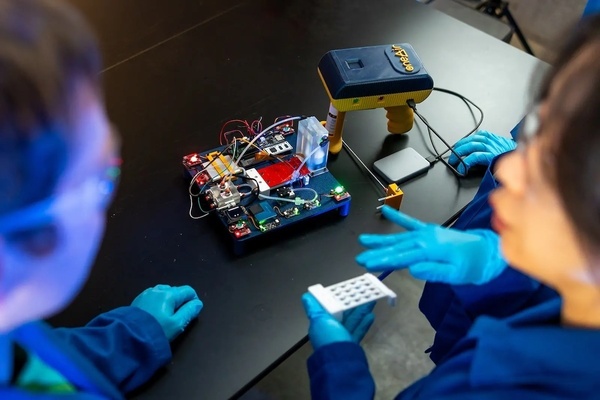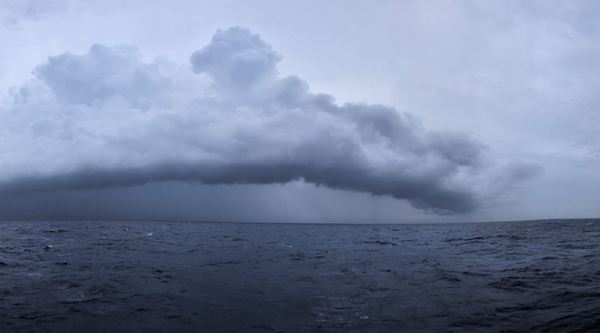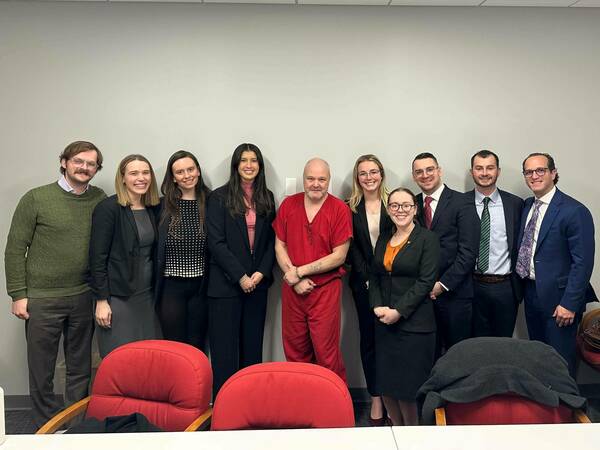ND Founders Profile #160: Faced with Contaminated Water on Nantucket, Two Women Take on PFAS with a Simple Test from Forever Analytical Solutions
It’s hard to imagine a more idyllic place than Nantucket. Located 35 miles off the coast of Massachusetts, the small island community is known for its beautiful beaches, quaint shingled buildings, streets lined with trendy shops and eateries, and rich history as a whaling center. About 20,000 people live on Nantucket year-round, but during the summer, the population swells to 80,000, fueled by tourists and vacation homeowners.
Despite its lovely appearance, Nantucket has a troubling side: its drinking water, supplied by a single aquifer, has been found to contain PFAS (per- and poly-fluoroalkyl substances), man-made chemicals in use since the 1940s that are linked to an array of health risks, including kidney and testicular cancer, liver damage, fertility issues in women, and developmental effects and delays in young children.
Residents of Nantucket may never have known of the PFAS contamination had it not been discovered at the Nantucket Memorial Airport and the diagnosis of cancer in a popular local fireman named Nate Barber. These occurrences caused Barber’s wife, Ayesha Khan, aided by college friend Jaime Honkawa, to go into detective mode to uncover why her otherwise healthy husband developed cancer.
“What we found is that one of the foams firefighters use to put out hazardous liquid fires like jet fuel contains PFAS. Nate and other Nantucket firefighters had done a lot of training with the foam and were told it was safe. It wasn’t. The used foam went into the ground and ultimately into the community’s water supply,” Khan says.
They also learned that PFAS—commonly known as “forever chemicals” because they can take over 1,000 years to degrade—have been used since the 1940s to make products resistant to water, heat, grease, and stains. This includes nonstick cookware, carpeting, clothing, packaging, and protective gear worn by firefighters.
“We couldn’t believe it,” Khan says. “I wanted to put fliers in everyone’s door warning them.”
Honkawa, a digital marketing strategist based in Los Angeles, had a better idea. She proposed the two co-found the Nantucket PFAS Action Group to educate locals on the hazards of PFAS. One of the first things they did was create a website, which serves as the hub for information and community engagement. Knowing that about 60 percent of Nantucket residents rely on private wells for water, there was an urgency to find a solution to locals potentially consuming contaminated water.
“We assume our water is safe, and if we have a well, it’s even safer,” explains Khan. “Actually, well water should be tested regularly, especially now with PFAS. Most people don’t know they should be testing their well water or how to go about it.”
Adds Honkawa, “Testing is expensive, complicated, and not very accurate. It’s also not required, so people don’t do it.”
Khan’s and Honkawa’s search for answers led them to University of Notre Dame professor Graham Peaslee, an expert in applied nuclear physics and, according to Khan, a “rockstar” in the PFAS world. Technology created by Peaslee is the basis for a new PFAS test, and a startup company spun out of Notre Dame called Forever Analytical Solutions is focused on commercializing it.
Notre Dame alumnus Hunter MacMillan is the Co-founder and CEO of Forever Analytical. “I joined the company because I recognized the positive impact we could have,” he explains. “Existing analytical techniques aren’t great. Our test is a quick and accurate way to detect total fluorine, an indicator of the presence of PFAS. Our initial focus is drinking water. We’re offering test kits to communities, businesses, and activists; literally anyone who wants to know if their water is safe for consumption.”
Forever Analytical’s PFAS water screening test ultimately became the centerpiece of a collaborative project launched by Khan and Honkawa in 2023: the PFAS Well Project. Forever Analytical agreed to provide the test kits and analysis at a reduced rate as part of the project
Among the goals of the PFAS Well Project was to provide the test kits free of charge to Nantucket residents regardless of financial situation, with local non-profit, the Nantucket Land and Water Council, underwriting the cost. The test kits would allow residents to quickly assess their wells and do further tests if PFAS was present in their water.
Some communities might have shied away from PFAS testing of their water supplies, fearful of the impact on property values or negative publicity toward public officials. Nantucket, however, which has an average home price of $4.4 million, embraced the opportunity. The well testing was publicized on the Nantucket PFAS Action Group’s social media platforms and word of mouth. Project partners also promoted it.
“The reaction we got was, ‘Where do we sign up?’” Khan explains. “We made it very easy. People could apply on our website. We had more than 350 participants sign up and began testing in spring 2024. After testing, people received documentation that scientific testing has been done to provide to local and state regulatory agencies. That was empowering.”
Forever Analytical provided expertise throughout the testing of water samples from Nantucket wells. “There was quite a bit more contamination than we expected,” McMillan reports. “We knew going in there was contamination near the airport. However, there were pockets of contamination across the island, including one at the side of a former cranberry bog. This was likely caused by agrichemicals.”
In August 2024, McMillan and Peaslee traveled to Nantucket to present the PFAS test findings to Nantucket residents, along with a map of contamination sites. The two also met with Nantucket city officials about conducting more testing and steps to prevent further PFAS contamination.
“Residents whose wells tested positive for PFAS were concerned about what to do,” MacMillan says. “Fortunately, there are water filtration systems for consumer and commercial use that can remove many PFAS contaminants. In Nantucket’s case, the city stepped up and converted those with wells in heavily contaminated areas to city water.”
Although intended to make Nantucket’s drinking water safer, Khan and Honkawa hope their pilot program powered by Forever Analytical becomes a national model. “If PFAS contamination can happen in a remote, high-income place like Nantucket, it’s happening across the country,” says Honkawa. “We want to share what we learned, show there is a more affordable, accurate way to test and bring people peace of mind that their water is safe to drink.”
MacMillan says Forever Analytical is developing a mobile version of their PFAS system to provide onsite testing for cities, water processing plants, and labs. The company is funding its efforts through SBIR grants from the U.S. Environmental Protection Agency. To remove the financial barrier of testing for cities and rural communities, MacMillan is also pursuing federal grants to partner with communities across the United States to test their water systems for PFAS.
“By offering a lower cost, easy-to-perform test, Forever Analytical makes testing for PFAS more accessible. Our goal is for everyone to have access to safe drinking water.”
Originally published by at ideacenter.nd.edu on February 03, 2025.
Latest Research
- Fighting for Better Virus DetectionAn electronic nose developed by Notre Dame researchers is helping sniff out bird flu biomarkers for faster detection and fewer sick birds. Read the story
- Notre Dame’s seventh edition of Race to Revenue culminates in Demo Day, a celebration of student and alumni entrepreneurship…
- Managing director brings interdisciplinary background to Bioengineering & Life Sciences InitiativeThis story is part of a series of features highlighting the managing directors of the University's strategic initiatives. The managing directors are key (senior) staff members who work directly with the…
- Monsoon mechanics: civil engineers look for answers in the Bay of BengalOff the southwestern coast of India, a pool of unusually warm water forms, reaching 100 feet below the surface. Soon after, the air above begins to churn, triggering the summer monsoon season with its life-giving yet sometimes catastrophic rains. To better understand the link between the formation of the warm pool and the monsoon’s onset, five members of the University of Notre Dame’s Environmental Fluid Mechanics Laboratory set sail into the Bay of Bengal aboard the Thomas G. Thompson, a 274-foot vessel for oceanographic research.
- Exoneration Justice Clinic Victory: Jason Hubbell’s 1999 Murder Conviction Is VacatedThis past Friday, September 12, Bartholomew County Circuit Court Judge Kelly S. Benjamin entered an order vacating Exoneration Justice Clinic (EJC) client Jason Hubbell’s 1999 convictions for murder and criminal confinement based on the State of Indiana’s withholding of material exculpatory evidence implicating another man in the murder.
- Notre Dame to host summit on AI, faith and human flourishing, introducing new DELTA frameworkThe Institute for Ethics and the Common Good and the Notre Dame Ethics Initiative will host the Notre Dame Summit on AI, Faith and Human Flourishing on the University’s campus from Monday, Sept. 22 through Thursday, Sept. 25. This event will draw together a dynamic, ecumenical group of educators, faith leaders, technologists, journalists, policymakers and young people who believe in the enduring relevance of Christian ethical thought in a world of powerful AI.












